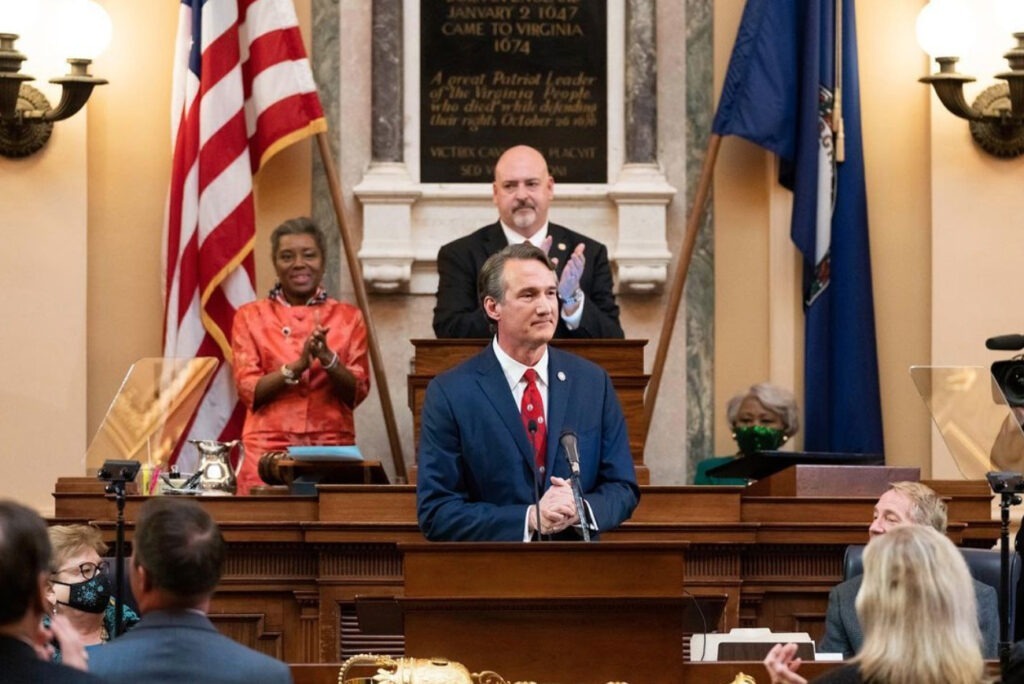Youngkin’s executive orders use the education system as a means to promote a political agenda
4 min read
Gov. Glenn Youngkin passed nine executive orders on his first day in office. @glennyoungkin | Instagram
MATTHEW NELSON
Staff Writer
On Jan. 15, 2022, the same day as his inauguration, Gov. Glenn Youngkin signed two executive orders regarding Virginia public education, which banned the use of critical race theory and gave parents more control over mask mandates in school systems respectively. These executive orders have created an environment where the government is taking expertise away from educators for the sake of their own political agenda, which negatively affects teachers’ ability to do their jobs.
The two executive orders were part of nine orders Youngkin signed to complete his campaign promises. The first order ended the use of “inherently divisive concepts” in schools, specifically identifying critical race theory as a topic to be excluded from curricula going forward. The second gave parents more control over whether their children wear masks by prohibiting school systems from setting mask requirements in regard to the ongoing COVID-19 pandemic. Youngkin summarized these measures as “removing politics from the classroom.”
“I just feel like everything is really politically motivated and not motivated for the betterment of students’ education,” said Chloe Wade, a master’s student in the five-year education program who teaches art in Stafford County.
Last November, critical race theory in particular played a pivotal role in the results of the gubernatorial election. Although it is not a part of American K-12 education, it was weaponized by many Republican platforms as a campaign tactic to prey on suburban parents’ fears. In an interview with Fox News, Youngkin said he hoped removing it from public education would improve the quality of history classes and how students understand American history.
The intention to prevent any “inherently divisive concepts” from education will halt any progress regarding the learning of racial history in the U.S.
“Critical race theory is not in the Virginia Standards of Learning (SOLs), which determine what teachers in the state of Virginia are required to teach their students in different grade levels and content areas,” said Melissa Wells, an assistant professor in the College of Education. “I believe that as teachers we are responsible for helping students develop their critical thinking skills, which means we have to approach topics from multiple perspectives. These exact critical thinking skills are vital to the future of democracy.”
Maddy Kidwell, a senior history major in the five-year elementary education program, disagrees that critical race theory is a divisive tactic and thinks that current curricula should be altered for more veracity.
“I definitely feel like they sugarcoat a lot of history in the curriculum, so I definitely feel like I would try to bring more honesty to it,” she said.
Wade agreed, adding that the language of “inherently divisive concepts” opened the door for restrictions on how teachers instruct many different topics.
“If you think about it, the topic of World War II can be divisive or the Civil War could be divisive,” said Wade. “I think it really depends on what type of lens you’re looking through and if the person teaching it has all the information that they need in order to teach it correctly.”
Wade also expressed concern that banning critical race theory would give critics a “backboard to attack other things that aren’t really related.” She specifically expressed concern over her lessons for the upcoming Black History Month and whether inclusivity in her lessons would lead to parental complaints.
The politicization of school curricula has led to a difficult situation for teachers because they’re trusted to teach the next generation, yet the government uses their classrooms to promote their political agenda.
Additionally, education students raised concerns about how the order against mask mandates takes decision-making away from education professionals. “I believe that [parents] should have a say in a lot of things since it is their children in the school, but I don’t think they necessarily understand the curriculum behind a lot of things and why teachers and school boards make the decisions they make,” Kidwell said.
Will Carpenter, a public school teacher in Washington, D.C. who received his master’s in education from UMW, agreed that he didn’t want parents to be completely separated from education but that the current political climate undermines the professional training teachers undergo.
“Ignoring [non-educators] isn’t right, but it just makes me sad that people who don’t spend their entire days in schools use school policies as a way to gain political power,” said Carpenter.
Wade added that students’ adherence to mask policies is reassuring, but she still feels nervous about the potential of Stafford County changing mask policies. “I really hope that the mask mandate stays in place … I see 600 students in a week, and that’s a lot of rotation in the classroom,” she said.
Parents having greater control over whether or not their children have to wear masks creates an environment where teachers have to put their health at risk in order to follow their passion. Furthermore, while the implementation of a political agenda within schools has not made Wade or Kidwell desire to change careers, it does make their jobs unnecessarily complicated.











